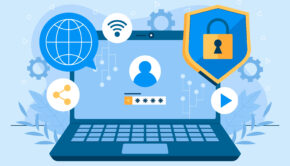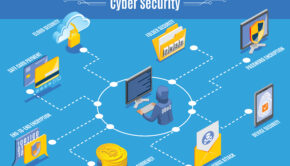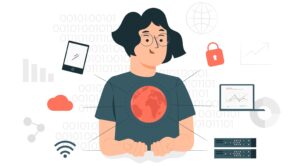Cybersecurity FAQs: Common Consumer Questions About Keeping Tech Safe
Cybersecurity seems straightforward: You want your private data kept private, so you use special programs and behaviors to prevent outsiders from gaining access. Unfortunately, the reality of cybersecurity is dramatically more difficult to ensure. Too many security options on the market coupled with too frequent change in standards and too little consumer education are terribly overwhelming. Rather than wrestle with passwords, antivirus scans, encryption, and worse, most consumers abandon any attempts to keep their devices safe and rely on hope and luck alone.
Unfortunately, a refusal to engage in cybersecurity efforts makes it almost certain that you will become the victim of an attack. If you are struggling to understand how to stay safe in today’s digital environment, here are the answers to a few common questions regarding security.
What’s so Bad about Being Unprotected?
Most cybercriminals are lazy, looking for the easiest possible targets to attack and exploit. Devices that lack any cybersecurity are child’s play to infiltrate. Plus, users who don’t know enough to protect their devices are also less likely to respond appropriately during an attack, which gives the attackers more control and greater rewards.
There are about 3 million home burglaries every year in the United States. Meanwhile, every year, more than 565 million emails containing malware are circulated around the U.S., and that’s not even close to all the malware on the internet. If you allow your devices to remain unprotected, you are not risking data theft, data loss and worse — you are guaranteeing it.
What Does Cybersecurity Mean?
Cybersecurity is a collection of technologies concerned with preventing harm to a device, network or data. There are two sides to any cybersecurity effort: the offense and the defense.
Most often, those offensive in cybersecurity are cybercriminals trying to attack and infiltrate devices and systems for some kind of gain. Cyberattacks affect all layers of tech users, from the government to private citizens. Different cybercriminals have different goals, but few of them are admirable or altruistic.
Correspondingly, the defensive side of cybersecurity aims to protect technology from penetration. There are all sorts of technologies and tactics intended to help keep your devices and data safe, from antivirus software to largescale encryption and firewalling. Recently, the U.S. Congress has introduced legislation intended to improve cyber defenses and reduce the success of cyberattacks. Most often, cybersecurity is defined and described by the defensive side

Who Needs Cybersecurity?
This one is simple: everyone who uses tech. There is not a single entity that can use connected devices without suffering an attack of some severity. The only reason you should ignore the concerns of cybersecurity is if you live far from civilization and have not once used a device — but since you’re reading this, you must become more engaged in cybersecurity training.
What is the Foundation of Effective Cybersecurity?
Knowledge is by far the most critical feature of strong cybersecurity. Though it is impossible for you to know about every virus on the web, understanding typical cybercriminal behavior and developing safe habits will sufficiently protect your devices and data. Called cyber hygiene or security hygiene, practices like using strong passwords, keeping login credentials private, updating software and recognizing corrupt messages and webpages will prevent the vast majority of cyberattacks. You can develop strong cyber hygiene by taking introductory cybersecurity courses or reading related articles around the web.
What Software Solutions are Essential?
Most of your devices likely have a few cybersecurity protections built-in. For example, your computer probably has a hardware firewall, and its operating system likely has a rudimentary virus scanner. However, it is wise to augment existing security with more advanced programs, such as max security antivirus software from a trusted security source. Modern anti-malware and antivirus programs use machine learning to predict the appearance of malware before it infects your device, so you can afford to know less about ever-evolving threats and remain thoroughly protected.
Are Lawmakers Trying to Help Cybersecurity Efforts?
As mentioned above, lawmakers are becoming more aware of the increasing threats of cybercrime, and as a result, many are attempting to push through legislation that would make the internet safer for all. Unfortunately, not all government agents see the benefit of this; in fact, some are working contrary to a more secure net. For example, in late 2017, the FCC voted to abolish net neutrality, which compelled internet providers to offer an equivalent level of protection to all web users. Now that the net is no longer neutral, you might have to pay for a safer web.
You can learn what your representatives are doing to safeguard your devices and data by contacting them and letting them know how much you care about cybersecurity.










![[DIY] Headphone removable cable mod](https://technofaq.org/wp-content/uploads/2014/04/IMG_2301-150x150.jpg)





